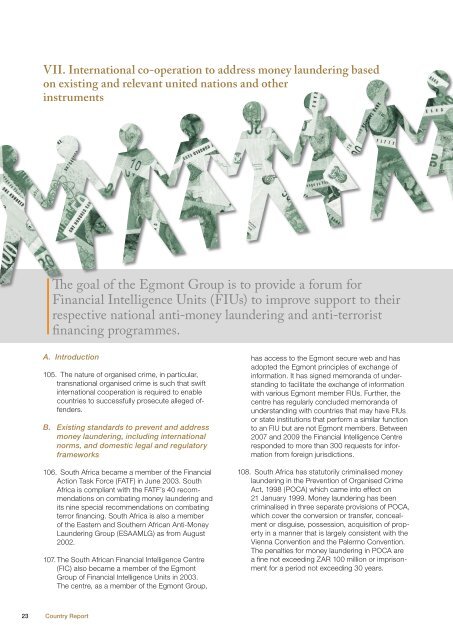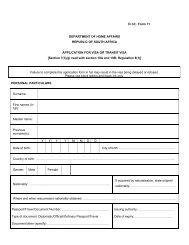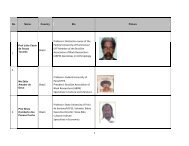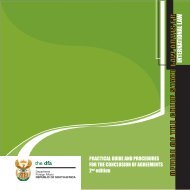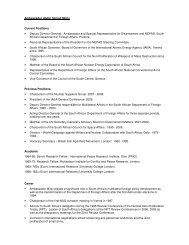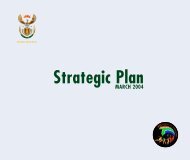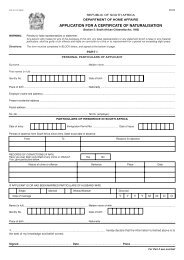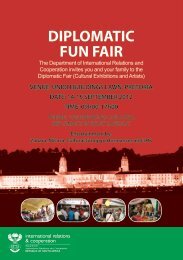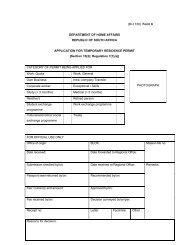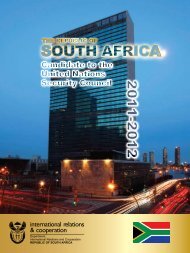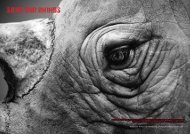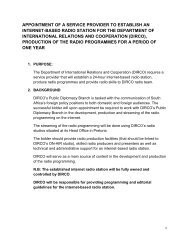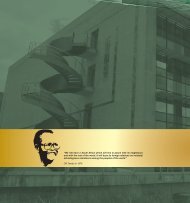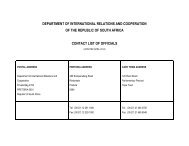Read more - Department of International Relations and Cooperation
Read more - Department of International Relations and Cooperation
Read more - Department of International Relations and Cooperation
You also want an ePaper? Increase the reach of your titles
YUMPU automatically turns print PDFs into web optimized ePapers that Google loves.
VII. <strong>International</strong> co-operation to address money laundering based<br />
on existing <strong>and</strong> relevant united nations <strong>and</strong> other<br />
instruments<br />
The goal <strong>of</strong> the Egmont Group is to provide a forum for<br />
Financial Intelligence Units (FIUs) to improve support to their<br />
respective national anti-money laundering <strong>and</strong> anti-terrorist<br />
financing programmes.<br />
A. Introduction<br />
105. The nature <strong>of</strong> organised crime, in particular,<br />
transnational organised crime is such that swift<br />
international cooperation is required to enable<br />
countries to successfully prosecute alleged <strong>of</strong>fenders.<br />
B. Existing st<strong>and</strong>ards to prevent <strong>and</strong> address<br />
money laundering, including international<br />
norms, <strong>and</strong> domestic legal <strong>and</strong> regulatory<br />
frameworks<br />
106. South Africa became a member <strong>of</strong> the Financial<br />
Action Task Force (FATF) in June 2003. South<br />
Africa is compliant with the FATF’s 40 recommendations<br />
on combating money laundering <strong>and</strong><br />
its nine special recommendations on combating<br />
terror financing. South Africa is also a member<br />
<strong>of</strong> the Eastern <strong>and</strong> Southern African Anti-Money<br />
Laundering Group (ESAAMLG) as from August<br />
2002.<br />
107. The South African Financial Intelligence Centre<br />
(FIC) also became a member <strong>of</strong> the Egmont<br />
Group <strong>of</strong> Financial Intelligence Units in 2003.<br />
The centre, as a member <strong>of</strong> the Egmont Group,<br />
has access to the Egmont secure web <strong>and</strong> has<br />
adopted the Egmont principles <strong>of</strong> exchange <strong>of</strong><br />
information. It has signed memor<strong>and</strong>a <strong>of</strong> underst<strong>and</strong>ing<br />
to facilitate the exchange <strong>of</strong> information<br />
with various Egmont member FlUs. Further, the<br />
centre has regularly concluded memor<strong>and</strong>a <strong>of</strong><br />
underst<strong>and</strong>ing with countries that may have FIUs<br />
or state institutions that perform a similar function<br />
to an FIU but are not Egmont members. Between<br />
2007 <strong>and</strong> 2009 the Financial Intelligence Centre<br />
responded to <strong>more</strong> than 300 requests for information<br />
from foreign jurisdictions.<br />
108. South Africa has statutorily criminalised money<br />
laundering in the Prevention <strong>of</strong> Organised Crime<br />
Act, 1998 (POCA) which came into effect on<br />
21 January 1999. Money laundering has been<br />
criminalised in three separate provisions <strong>of</strong> POCA,<br />
which cover the conversion or transfer, concealment<br />
or disguise, possession, acquisition <strong>of</strong> property<br />
in a manner that is largely consistent with the<br />
Vienna Convention <strong>and</strong> the Palermo Convention.<br />
The penalties for money laundering in POCA are<br />
a fine not exceeding ZAR 100 million or imprisonment<br />
for a period not exceeding 30 years.<br />
23 Country Report


